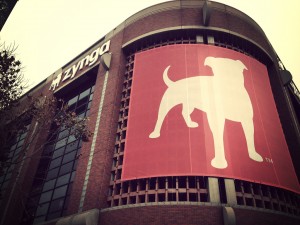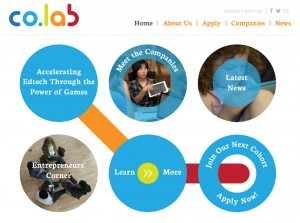Co.lab wants to be more than be an edtech accelerator. It wants to be the bridge between those that want to make games that teach and the commercial world’s focus on creating and marketing quality.
The accelerator program based in San Francisco is a partnership between the New Schools Venture Fund and the philanthropic wing of game-maker Zynga and, according to executive director Esteban Sosnik, the resulting lab is more than just a way to ramp up a prototype or accrue another round of funding.
“Co.lab offers three core things, first we supply a mentor to each company to help them strengthen their business in multiple ways, whether it is in product development, marketing or fundraising,” said Sosnik.
“Second, we create office hours where companies in the cohort can learn from some of the smartest people about how to bring a product to scale or tackle a technical challenge,” he added. “And third, we can connect these businesses to the New School Venture Fund partners which means we can put these businesses in touch with real teachers dealing with the issues they want their game or product to solve.”
Even though the lab is still working with the first cohort of companies — five firms selected in September and set to complete their time in the accelerator in December — it has already attracted real buzz in the industry.
Last month, Kidaptive, one of the companies moving through the accelerator, closed its latest round of funding by pulling in $10.1 million around its iPad learning tools.
The funding supports a far more advanced learning game than some of the more basic tools available for tablets, cofounder and chief learning scientist Dylan Arena told Fast Company.
“We have a fully defined model of a learner and use statistical techniques to update it based on the observed behavior,” he said, adding the game quickly adapts to the student and a parents’ version allows them to track 87 separate learning goals, including colors and shapes, creativity, and perseverance.
Kidaptive is just one of the five companies moving through co.lab, but the results thus far have Sosnik optimistically looking towards the second group set to begin in March. The lab is accepting applications through this month and will conduct interviews with potential firms in January. By February the new cohort of between five and 10 companies will be named and they will begin their four-month program the next month.
A Culture of Change

The Zynga offices in San Francisco are home to co.lab. Photo by Elaine Adolpho
One thing Sosnik stressed is that each company must co-locate or work entirely from the lab’s offices based inside the Zynga offices. The San Francisco location, he said, gives the companies access to some of the best thinking in the learning games and general games fields and he said the lab wants to foster a feeling of cooperation among the firms and with the Zynga employees.
“We are really hoping to be a hub, a community of people who want to not just make great games, but also change the way children learn,” Sosnik said.
And that desire to change education runs throughout the co.lab effort. In announcing the new effort, Zynga co-founder Mark Pincus said, “We really believe games can be a force for good–not just for good fun, not just for good entertainment, but to help people grow their minds more than they could watching TV.” And Sosnik echoes those thoughts in describing why he came on board to oversee the lab.
And one of the ways he said that was happening was by opening some developers’ eyes to the possibility of putting the games and tools into the classroom.
“What we have seen is a surprising number of companies that were building games for the consumer market and the more they think about it and the more they learn about it, the more they are considering moving into the classroom market with their game,” Sosnik said.
A veteran of the venture capital world as well as a game developer with more than a decade of experience, Sosnik credited the desire to effect change as one of the things he wants from the lab and the new companies that join the accelerator.
He stressed that above all else he and his team are looking for “mission-driven entrepreneurs” who want to effect change through games and technology. Beyond that there are few specific limits on what kind of companies can join co.lab. Sosnik said they will accept for-profits or non-profits, larger firms looking to develop one product or small start-ups. Companies can also either be developing content products – like a specific game – or tools.
“As part of participating in co.lab, companies receive a stipend between $25,000 and $50,000 as well as the accelerator services and resources,” according to the co.lab site. “In exchange we ask for a nominal equity stake, which generally ranges between 0.5 and 5 percent, depending on stage of growth.”
The lab has already received intense interest from several new firms and hopes to announce in early February what the second group of co.lab companies will be building.

